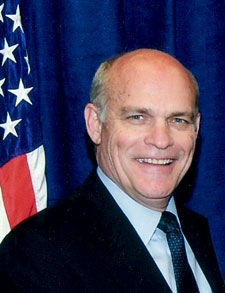In advance of World Malaria Malaria Day, ASTMH asked some of our malaria expert members and colleagues to reflect on the global fight against the disease and to peer into their crystal balls and let us know what might be on the horizon. Other interviews in this series include: ASTMH President Alan J. Magill, ASTMH Councilor Laurence Slutsker of the CDC, Judith E. Epstein of the Naval Medical Research Center, Kent Kester of Sanofi Pasteur and Science Consultant Jessica Taaffe.
 Rear Admiral Timothy Ziemer, U.S. Global Malaria Coordinator, President’s Malaria Initiative
Rear Admiral Timothy Ziemer, U.S. Global Malaria Coordinator, President’s Malaria Initiative
What about malaria has drawn you to this work?
Most American’s have been raised unaware of the devastating impact that malaria has on individuals and communities around the world.
I was raised in Asia, and was infected by malaria as a child. A good friend of mine, lost his young daughter to the disease. When I was offered the role as the U.S. Global Malaria coordinator to lead the President’s Malaria Initiative, I felt privileged and compelled to do what I could to help achieve the goal of saving lives and removing the significant burden that malaria has on the health systems and communities - particularly in Africa.
As we approach World Malaria Day, what is the biggest challenge with this disease?
First of all, we need to recognize the significant progress that has been made in the fight against malaria over the last decade. It’s really quite remarkable. That said, there is a risk of becoming victims of our own success. As the drop in all cause child mortality and overall burden of malaria declines the investments and priorities are at risk of being shifted away to other competing needs. In simple terms, we can’t take our eye off the ball, because, as we have seen with history where we have well-documented cases of malaria having been close to elimination and yet it came roaring back! And real challenges exist, if not addressed, the threats of resistance and sub-standard anti-malaria drugs for example will undermine our efforts.
Where do you see the most promise?
I’m encouraged by the priority that the political leaders in Africa and Asia have placed on the elimination of malaria from their countries through the African Leaders Malaria Alliance and the Asia Pacific Leaders Malaria Alliance. The global malaria community has come together under the Roll Back Malaria Partnership in a collaborative way to leverage and maximize our collective efforts. I’m encouraged by the contributions of the research community to preserve and improve our existing interventions and develop new anti-malaria drugs and hopefully, an effective, affordable vaccine in the future.